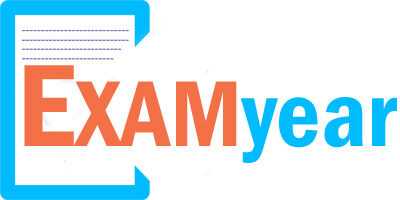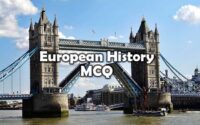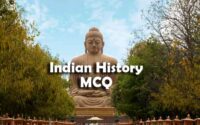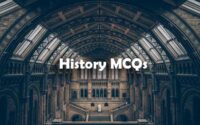NDA History Questions
Find the direct download link for NDA History Questions paper pdf in the section below. Aspirants who are looking for NDA History General Knowledge Papers can find in the table below. Are you searching for the National Defence Academy and Naval Academy History Sample Papers for starting exam preparation?
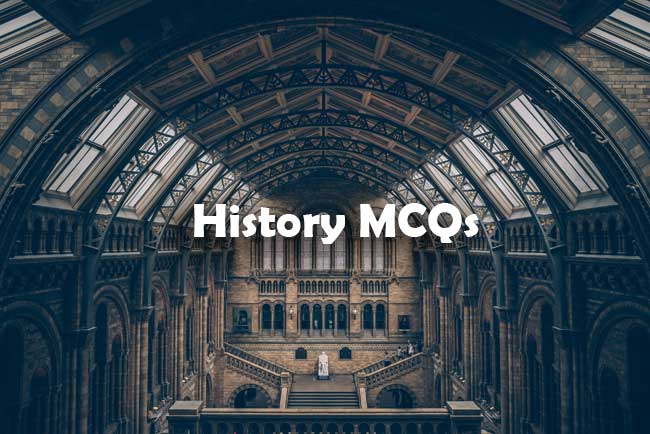
Don’t worry. We attached the free downloading links of National Defence Academy and Naval Academy History General Knowledge Old Papers. By referring the Last 5 years National Defence Academy and Naval Academy History Previous Question Papers, candidates can analyse the exam pattern.
NDA History Questions Papers will help you to get a good score in the exam. By clicking on the below-enclosed links, you can download the NDA History Questions Papers with solutions in the form of Pdf.
History Questions for NDA Exam
1. The word Atharva denotes :
(A) Undivided god
(B) Healing through spells
(C) Holy magic
(D) Chief priests
2. Mahavira discarded all clothing like :
(A) Parsvanath
(B) Gosala
(C) Basava
(D) Buddha
3. The term Karpatika refers to :
(A) Group of Professionals
(B) Caravans of Pilgrims
(C) Cow-herd
(D) Band of Army
4. The Bhattiprolu relic casket inscription was found in :
(A) Maharashtra
(B) Punjab
(C) Karnataka
(D) Andhra Pradesh
5. Besnagar pillar inscription was set up by :
(A) Chandragupta Maurya
(B) Seleucus
(C) Ashok
(D) Heliodorus
6. The author was not an ambassador to the Mauryan courts :
(A) Megasthenes
(B) Deimachus
(C) Dionysius
(D) Patrocles
7. Which of the following was not the function of the special intelligence branch during Mauryan times ?
(A) VIP security
(B) Political intelligence
(C) Counter-intelligence
(D) Revenue intelligence and vigilance of corrupt officials
8. The Tolkappiyam is a work on :
(A) Code of Conduct
(B) Grammar
(C) Trade
(D) Surgery
9. The concept of Kaliyuga is seen to be clearly enunciated in :
(A) Post-Mauryan period
(B) Early Vedic period
(C) Pre-Mauryan period
(D) Buddhist period
10. Where was the port of Barbaricum situated ?
(A) At the mouth of the Ganga
(B) At the mouth of the Kaveri
(C) At the entrance to the Gulf of Cambay
(D) On the Indus Delta
11. In the Gupta period, what was the most important means of extending arable land ?
(A) Conquest
(B) Land grants
(C) Encouragement to peasants
(D) Emergence of the towns
12. Which of the following countries was the centre of East-West trade during the Gupta period ?
(A) India
(B) Sri Lanka
(C) Burma
(D) Egypt
13. The Chalukyas of Kalyani built up their power on the reigns of :
(A) The Rashtrakutas
(B) The Hoysalas
(C) The Cholas
(D) The Kakatiyas
14. Who among the following Pratihar rulers was defeated by the Rashtrakuta ruler Govind III ?
(A) Vatsaraja
(B) Nagabhatta II
(C) Mihir Bhoja
(D) Mahipala
15. In which of the following geographical/ecological zones are hero stones least likely to be found ?
(A) Uplands
(B) Plains
(C) Passes in hilly country
(D) Frontier zones
16. The treatise ‘Daya bhaga’ which is the foundation of the Hindu law of inheritance was written by :
(A) Gundayabhatta
(B) Vijñaneshwara
(C) Rajasekhara
(D) Jimutavahana
17. A major port for the import of horses in India in the early medieval period was :
(A) Kalyan
(B) Thana
(C) Sopara
(D) Cambay
18. The freeze carved on two huge rocks depicting the descent of the Ganga is to be found at :
(A) Pattadkal
(B) Ellora
(C) Mahabalipuram
(D) Hampi
19. An inscription with Tamil characters dating to the 13th century has been found in :
(A) Burma
(B) Cambodia
(C) China
(D) Thailand
20. Some of the most important Jain writings in Sanskrit in the 13th century emerged from :
(A) Gujarat
(B) Rajasthan
(C) Bihar
(D) Karnataka
|
More History Questions for Preparation
|
|
| UPSC | TNPSC |
| GPSC | WBCS |
| NDA | SSC CHSL |
| DSSB | SSC CGL |
| AFCAT | MTS |
| RRB NTPC | MPSC |
| MPPSC | CDS |
| BPSC | |
21. The port of Lahiri Bandar in Sindh is described in the travel account of :
(A) Marco Polo
(B) Nicolo Conti
(C) Jean-Baptiste, Tavernier
(D) Ibn Batutah
22. One of the early Marathi Literary compositions influenced by the Nathpanthis is the :
(A) Viveka Darpana
(B) Kadambari
(C) Buddhacharitam
(D) Raghuvansam
23. Which of the following Indian dynasties sent diplomatic mission to China ?
(A) Chola and Pandya
(B) Tughlaq and Chola
(C) Tughlaq and Khalji
(D) Chola and Vijayanagar
24. During the reign of which Delhi Sultan did the first raids into the Deccan take place ?
(A) Balban
(B) Jalaluddin Khalji
(C) Alauddin Khalji
(D) Muhammad-bin-Tughlaq
25. In which of the following Persian accounts do we get the maximum information about the Deccan ?
(A) Khafi Khan’s Muntakhab-ul-Lubab
(B) Saqi Mustaid Khan’s Ma’asir-i-Alamgir
(C) Bhimsen’s Nuskha-i-Dilkusha
(D) Shahnawazj Khan’s Ma’asir-ul-Umara
26. Under which Sufi saint did Amir Khusrau study ?
(A) Nasiruddin Chiragh
(B) Nizamuddin Auliya
(C) Moinuddin Chishti
(D) Salim Chishti
27. Didactic literature and the discourses of the Sufi Pirs are collectively known as :
(A) Malguzar
(B) Malfuzat
(C) Malojihat
(D) Mal
28. In the Vijayanagar Empire, a sort of income tax on the basis of net profit was levied on :
(A) Industries
(B) Properties
(C) Professionals
(D) Trade
29. The rai (crop rate) was introduced by :
(A) Akbar
(B) Malik Ambar
(C) Sher Shah
(D) Mahmud Gawn
30. The year in which the rupee became the basic unit of currency in the reign of Akbar was :
(A) 1556
(B) 1579
(C) 1590
(D) 1582
31. One of the earliest of the Persian taxts to be translated into English was that of :
(A) Abul Fazl
(B) Ferishtah
(C) Ziauddin Barni
(D) Isami
32. Calcutta was founded in 1690 by :
(A) Job Charnock
(B) Francis Day
(C) Robert Clive
(D) John Surman
33. The Mayamata is the text that deals with :
(A) Fort architecture
(B) Palace architecture
(C) Temple architecture
(D) Sculpture
34. Zhadti means :
(A) An annual Maratha revenue document showing the whole income and expenditure from an area
(B) Non-hereditary grant of land
(C) A contract specifying rights and responsibilities
(D) An important official at the district level
35. Who introduced the Permanent Settlement in Bengal, and when ?
(A) Robert Clive, 1757
(B) Warren Hastings, 1774
(C) Lord Cornwallis, 1793
(D) Sir John Shore, 1798
36. Lord Dalhousie tried to snatch away the remaining glory of the Mughal Emperor Bahadur Shah II by :
(A) Reducing his pension
(B) Forcing him to disarm his bodyguards
(C) Derecognising his imperial title
(D) Asking him to vacate the Red Fort and move to a humbler place
37. Who led a British Expeditionary force into Tibet ?
(A) Colonel Leslie Bradford
(B) P. C. Lenoir
(C) Lord Lytton
(D) Sir Francis Younghusband
38. The so-called ‘Bombay Survey System’ was framed in 1835 by :
(A) Wingate and Goldsmith
(B) Grant Duff and Elphinstone
(C) Chaplin and Roberts
(D) Metcalfe and Chaplin
39. An early attempt to start a factory in India was made in 1835 in :
(A) Bombay
(B) Surat
(C) Ahmadabad
(D) Poona
40. Among the major supporters of British rule were :
(A) The emerging Indian capitalist class
(B) The landlords
(C) The peasants
(D) The working class
| Ancient India | Modern India |
| Medieval India | World History |
41. The new legal system introduced by the British in India :
(A) Gave peasants greater freedom
(B) Gave the village moneylender more freedom to control and dominate
(C) Gave an impetus to handicrafts
(D) Promoted money economy
42. The American civil war boosted the export of cotton from………….. .
(A) India to England
(B) India to China
(C) India to Japan
(D) India to Australia
43. Sir Richard Strachey was appointed in 1867 as :
(A) Inspector-General of Irrigation
(B) Inspector-General of Police
(C) Collector of Poona
(D) Governor of Bombay Presidency
44. The growth of the Indian capitalist class was hampered in the 19th Century by :
(A) The growing national consciousness
(B) The trade union movement
(C) Tariff and trade policies of the imperial government
(D) The lack of a mobile workforce
45. In which year did Dr. Babasaheb Ambedkar establish the Bahishkrit Hitakarini Sabha ?
(A) 1919
(B) 1924
(C) 1928
(D) 1932
46. The object of the Butler committee of 1927 was to :
(A) Improve the relationship between the Government of India and the Indian States
(B) Modernise the Indian Army
(C) Modernise the Indian Agriculture
(D) Suppress National Movement
47. Who observed “The Congress is in reality a civil war without arms” ?
(A) Lord Dufferin
(B) M. A. Jinnah
(C) Sir Syed Ahmad Khan
(D) Lord Curzon
48. The first session of the All India Trade Congress held in 1920 was presided over by :
(A) Mahatma Gandhi
(B) V. V. Giri
(C) Lala Lajpat Rai
(D) N. M. Joshi
49. The Nagpur Flag Satyagraha was organised in 1923 against :
(A) The order banning the use of the Congress flag
(B) The indiscriminate arrests for hoisting the Congress flag
(C) The order banning the singing of the song Vandemataram
(D) The ban on public meetings
50. The first of many popular attacks against the British in the 1930s was launched by :
(A) Surya Sen in Chittagong
(B) Bhagat Singh in the Central Legislative Assembly
(C) Lala Lajpat Rai against the Simon Commission
(D) Sardar Vallabhbhai Patel in Bardoli
